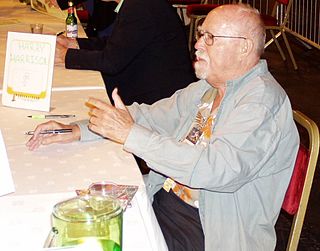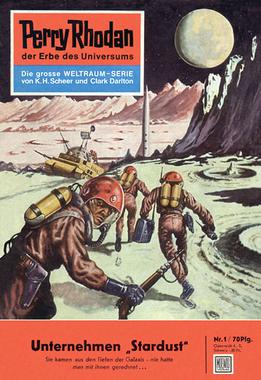Related Research Articles

Donald Allen Wollheim was an American science fiction editor, publisher, writer, and fan. As an author, he published under his own name as well as under pseudonyms, including David Grinnell, Martin Pearson, and Darrell G. Raynor. A founding member of the Futurians, he was a leading influence on science fiction development and fandom in the 20th-century United States. Ursula K. Le Guin called Wollheim "the tough, reliable editor of Ace Books, in the Late Pulpalignean Era, 1966 and '67", which is when he published her first two novels in Ace Double editions.

Science fiction is a genre of speculative fiction, which typically deals with imaginative and futuristic concepts such as advanced science and technology, space exploration, time travel, parallel universes, and extraterrestrial life. It is related to fantasy, horror, and superhero fiction and contains many subgenres. Its exact definition has long been disputed among authors, critics, scholars, and readers.

Science fiction fandom or SF fandom is a community or fandom of people interested in science fiction in contact with one another based upon that interest. SF fandom has a life of its own, but not much in the way of formal organization.
Worldcon, or more formally the World Science Fiction Convention, the annual convention of the World Science Fiction Society (WSFS), is a science fiction convention. It has been held each year since 1939. The members of each Worldcon are the members of WSFS, and vote both to select the site of the Worldcon two years later, and to select the winners of the annual Hugo Awards, which are presented at each convention.

Robert Shaw was a science fiction writer and fan from Northern Ireland, noted for his originality and wit. He won the Hugo Award for Best Fan Writer in 1979 and 1980. His short story "Light of Other Days" was a Hugo Award nominee in 1967, as was his novel The Ragged Astronauts in 1987.

Harry Max Harrison was an American science fiction author, known mostly for his character The Stainless Steel Rat and for his novel Make Room! Make Room! (1966). The latter was the rough basis for the motion picture Soylent Green (1973). Long resident in both Ireland and the United Kingdom, Harrison was involved in the foundation of the Irish Science Fiction Association, and was, with Brian Aldiss, co-president of the Birmingham Science Fiction Group.

Perry Rhodan is a German space opera franchise, named after its hero. It commenced in 1961 and has been ongoing for decades, written by an ever-changing team of authors. Having sold approximately two billion copies worldwide, it is the most successful science fiction book series ever written. The first billion of worldwide sales was celebrated in 1986. The series has spun off into comic books, audio dramas, video games and the like. A reboot, Perry Rhodan NEO, was launched in 2011 and began publication in English in April 2021.

Science fiction conventions are gatherings of fans of the speculative fiction genre, science fiction. Historically, science fiction conventions had focused primarily on literature, but the purview of many extends to such other avenues of expression as films, television, comics, animation, and games. The format can vary but will tend to have a few similar features such as a guest of honour, discussion panels, readings and large special events such as opening/closing ceremonies and some form of party or entertainment. Science fiction conventions started off primarily in the UK and US but have now spread further and several countries have their own individual conventions as well as playing host to rotating international conventions.
Tolkien fandom is an international, informal community of fans of the works of J. R. R. Tolkien, especially of the Middle-earth legendarium which includes The Hobbit, The Lord of the Rings, and The Silmarillion. The concept of Tolkien fandom as a specific type of fan subculture sprang up in the United States in the 1960s, in the context of the hippie movement, to the dismay of the author, who talked of "my deplorable cultus".
A strong element in contemporary Canadian culture is rich, diverse, thoughtful and witty science fiction.

Roadside Picnic is a philosophical science fiction novel by Soviet-Russian authors Arkady and Boris Strugatsky, written in 1971 and published in 1972. It is the brothers' most popular and most widely translated novel outside the former Soviet Union. As of 2003, Boris Strugatsky counted 55 publications of Roadside Picnic in 22 countries.
Eurocon is an annual science fiction convention held in Europe. The organising committee of each Eurocon is selected by vote of the participants of the previous event. The procedure is coordinated by the European Science Fiction Society. The first Eurocon was held in Trieste, Italy, in 1972. Unlike Worldcons, Eurocon is usually a title attached to an existing convention. The European SF Awards are given in most of the conventions giving recognition to the best works and achievements in science fiction.
Photon Tide is a science fiction society from Novi Sad, Serbia. They held a first ever Star Trek convention in Serbia, featured in a documentary film "Trekkies 2".

Science fiction is an important genre of modern Japanese literature that has strongly influenced aspects of contemporary Japanese pop culture, including anime, manga, video games, tokusatsu, and cinema.

Mundane science fiction (MSF) is a niche literary movement within science fiction that developed in the early 2000s, with principles codified by the "Mundane Manifesto" in 2004, signed by author Geoff Ryman and "The Clarion West 2004 Class". The movement proposes "mundane science fiction" as its own subgenre of science fiction, typically characterized by its setting on Earth or within the Solar System; a lack of interstellar travel, intergalactic travel or human contact with extraterrestrials; and a believable use of technology and science as it exists at the time the story is written or a plausible extension of existing technology. There is debate over the boundaries of MSF and over which works can be considered canonical. Rudy Rucker has noted MSF's similarities to hard science fiction and Ritch Calvin has pointed out MSF's similarities to cyberpunk. Some commentators have identified science fiction films and television series which embody the MSF ethos of near-future realism.
The Birmingham Science Fiction Group (BSFG), also known as the "Brum Group", held its first meeting on 25 June 1971. It runs regular meetings in Birmingham, England, where SF fans can meet one another and professionals in the field in a friendly environment, and has organised the annual SF convention Novacon since 1972.
Miroslav Žamboch is a Czech physicist and author known for writing novels and short stories in the science fiction and fantasy genres.
Festival fantazie is the largest festival of speculative fiction in the Czech Republic and one of the largest in Central and Eastern Europe. As for number of particular programs it surpasses the longest running science fiction convention Worldcon. In this sense Festival fantazie belongs among the biggest festivals of its kind in the world. In 2007 the festival was visited by 2135 individuals, who stayed for 5 days on average, Festival fantazie Speciál in autumn entertained 640 participants.
The Ditmar Award has been awarded annually since 1969 at the Australian National Science Fiction Convention to recognise achievement in Australian science fiction and science fiction fandom. The award is similar to the Hugo Award but on a national rather than international scale.

The following outline is provided as an overview of and topical guide to science fiction:
References
1. "Erore website - friends of Ertar in Czech Republic" (in Czech). Prague: DČSS.
2. "Mysli si svět". Magazin SEDMIČKA, No 52/1991 (in Czech). Prague: Mladá fronta.
3. Beneš, Pavel. "Jak by se žilo uvnitř duté Země". Magazin EPOCHA, No 4/2016 (in Czech). Prague: RF HOBBY s. r. o.